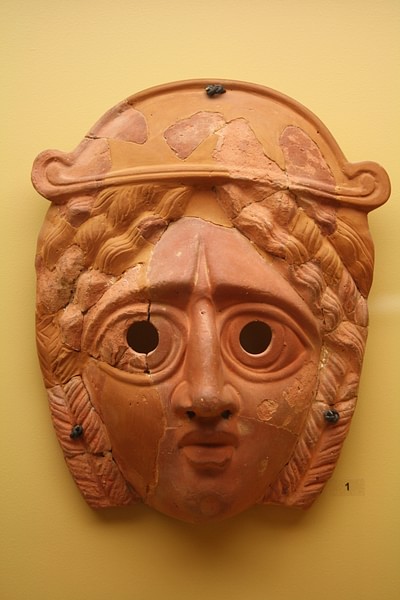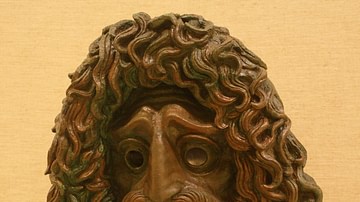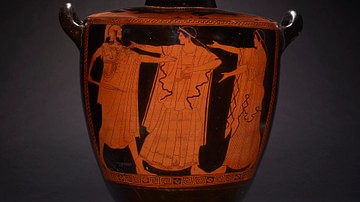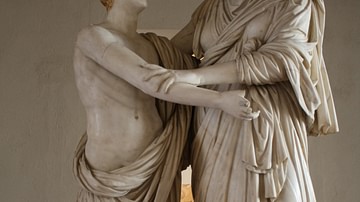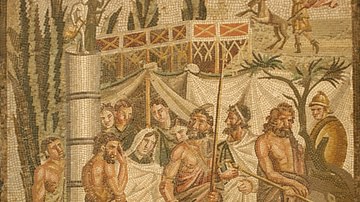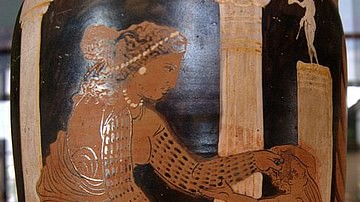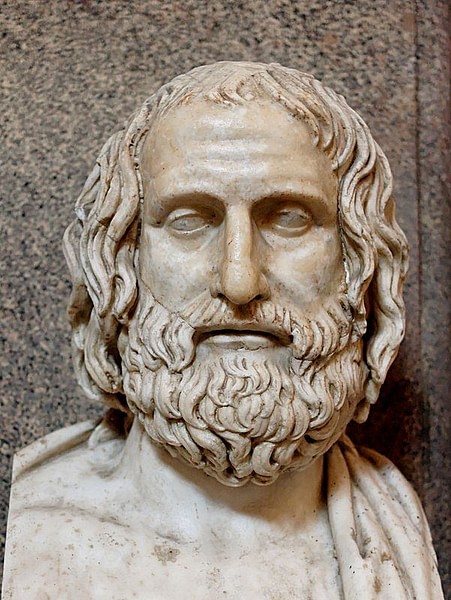
Euripides (c. 484-407 BCE) was one of the greatest authors of Greek tragedy. In 5th century BCE Athens his classic works such as Medeia cemented his reputation for clever dialogues, fine choral lyrics and a gritty realism in both his text and stage presentations. The writer of some 90 plays, Euripides was also famous for posing awkward questions, unsettling his audience with a thought-provoking treatment of common themes, and spicing up the story with thoroughly immoral characters. This is probably why Euripides won only a few festival competitions compared to his great tragedian rivals Aeschylus and Sophocles, although he was tremendously popular with the public. The popularity of Euripides' work has never diminished and his plays continue to be performed in theatres today.
Euripides' Life
Born in Athens c. 484 BCE to a well-to-do family, Euripides was the youngest of the city's other great tragedy playwrights; Aeschylus and Sophocles. In his youth, Euripides also performed as an actor but as his voice was not strong enough to carry to the back of a typical 14,000-seat Greek theatre, he concentrated on his role as a playwright. In ancient Greek tragedy, this meant also being producer and director of the play.
A Greek tragedy was typically performed at important religious festivals such as the City Dionysia where three playwrights each wrote three tragic plays and a satyr play to compete for a prize. Tragedy plays were restricted by certain conventions:
- The theme was mythological with elements of religion and family affairs.
- A maximum of three actors could have speaking roles (although they could play multiple characters).
- A chorus consisted of 12 or 15 singers.
- All actors were males wearing masks.
Nevertheless, despite these restrictions, Euripides managed to appeal through the presentation of universal themes of relevance to his audience, themes such as justice versus revenge, the rule of law against the will of the gods, and the struggle between reason and passion. The characters in Greek tragedy were usually society's elite and the story often dealt with matters of state, however, Euripides gave prominent roles to intelligent female characters and included significant parts for more ordinary citizens in his works. This is reflected in a comment attributed to him by Aristophanes in his comedy play Frogs: "I made tragedy more democratic". Euripides also removed the previously prominent roles of Greek gods and generally restricted their appearance to only the beginning or end of his plays.
Tradition holds that Euripides was something of an unpopular recluse who shunned laughter and wrote his plays in a cave near Salamis surrounded by his extensive library. The reality, though, was that audiences loved his innovative productions and controversial themes. Euripides was credited with being on an intellectual par with philosophers and his characters are given great rhetorical skills (sometimes even in sung speeches, previously the exclusive role of the chorus) and plots are made both intricate and unpredictable. Familiar myths are treated with unconventional twists and altered chronologies to freshen the tales and ensure the audience was gripped by the story.
In competitions, Euripides was not particularly successful. Indeed, his very first competition trilogy, performed in 455 BCE, came in third and last place. Of his 90 plays, only four won first prize, compared to a 50% win rate for Aeschylus and Sophocles. On the other hand, perhaps a more telling statistic is the fact that the Athenians funded his productions over 90 times and so clearly thought his work of merit regardless of their final position at the end of the festival.
Euripides spent his final years at the court of Archelaus, the king of Macedon. The great playwright died there in c. 407 BCE but not before he wrote the now lost play Archelaos which dealt with the mythical founding of the royal dynasty. Several of Euripides' plays were presented posthumously, including the Bacchae. The fact that the celebrated comedy playwright Aristophanes constantly made references to Euripides (and therefore expected his audience to be familiar with his work) illustrates his fame when he was alive. Further, the selection of several of his plays for study material as part of a rounded Greek education meant that Euripides' tragedies lived on for centuries. Their continued study in academia and regular performances in the modern world have only perpetuated the long tradition of Greek tragedy and the name of one of its greatest protagonists.
Euripides' Works
Of around 90 plays only 18 complete tragedies and one satyr-play survive, the latter being a genre of bawdy comedy which covered stories from Greek mythology and which had a chorus of satyrs, the followers of the god of wine and revelry Dionysos. Another play, the Rhesus, is disputed by scholars as being written by him. Several fragments, some substantial, survive from 9 other plays. Without doubt the most famous play is Medeia, while critics most esteem his Bacchae. Most often the tragic element of the plays derives from the suffering of the main character and their inability, no matter what they try, to improve their situation. In the words of Aristotle: "Euripides is the most intensely tragic of all the poets." (Poetics, ch. 14).
- Alcestis (438 BCE) - where Alcestis sacrifices herself to save her husband but is ultimately saved by Hercules from the supernatural figure of Death.
- Medeia (431 BCE) - where Jason, of the Golden Fleece fame, abandons the title character for the daughter of the King of Corinth with the consequence that Medeia kills her own children in revenge.
- The Children of Hercules (aka Heraclidae, c. 430 BCE) - with the eternal conflict between power and justice as its central theme.
- Hippolytus (428 BCE) - where holding one's principles leads to destruction for Phaedra and Hippolytus.
- Andromache (c. 425 BCE) - where, after the Trojan War and now a slave, Andromache battles with Hermione, the wife of her master.
- Hecabe (c. 423 BCE) - where the Queen of Troy seeks revenge for the death of her son Polydorus.
- Suppliants (c. 423 BCE) - where the mothers of the Seven Against Thebes appeal to Athens so that the Thebans will allow the proper burial of their sons.
- Hercules (c. 417 BCE) - dealing with the madness which drove Hercules to kill his wife and children.
- Electra (c. 417 or 414 BCE) - where Electra and Orestes conspire to destroy their mother.
- Trojan Women (415 BCE) - with Hecabe again the key character amid a catalogue of Trojan misery.
- Ion (412 or 410 BCE) - which examines the discrepancies between religious faith and the human condition.
- Iphigenia among the Taurians (c. 412 BCE) - where Iphigenia and Orestes battle the gods and Fate with a surprisingly happy ending.
- Helen (412 BCE) - which describes the reconciliation of Helen and Menelaus.
- Cyclops (412 or 408 BCE) - a satyr play describing Odysseus' encounter with the Cyclops on his long return journey to Ithaca following the Trojan War. It is the only complete surviving satyr play from Greek theatre.
- Phoenician Women (aka Phoenissae, 409 BCE) - where a group of innocent women travelling to Delphi are trapped in Thebes.
- Orestes (c. 408 BCE) - where Orestes kills his own mother and tries, without success, to take revenge on his aunt Helen.
- Iphigenia in Aulis (after 406 BCE and produced posthumously) - where Agamemnon must sacrifice Iphigenia for the good of the Greek expedition against Troy.
- Bacchae (after 406 BCE) - in which there is a running conflict between Pentheus, king of Thebes, and a demonic Dionysos.
Incomplete plays, often only fragments of which survive: Telephus, Cretans, Cresphontes, Erechtheus, Phaethon, Alexander, Oedipus, Hypsipyle, and Archelaus.
Quotes
Below is a selection of extracts from Euripides' works:
O Zeus, what am I to say? Do you watch over men or are we fools, blind fools to believe this, and is it chance that oversees all man's endeavours? Hecabe 488-91
We're fools in love - it's plain enough - clinging to this glitter here on earth because we don't know any other life and haven't seen what lies below. Hippolytus 189-96
My friends, I have decided to act at once. I will kill the children and then quit this land. I will not delay and so deliver them to other hands to spill their blood more eagerly. They must be killed; there is no other way. And since they must, I will take their life, I who gave them life. Come, my heart, put on your armour! Medea 1240-42
As for being a king, it is overrated. Royalty conceals a life of torment behind a pleasant facade. To live in hourly fear, looking over your shoulder for the assassin - is that paradise? Is it even good fortune? Give me the happiness of a plain man, not the life of a king, who loves to fill his court with criminals, and hates honest men for fear of death. Ion 613-18
So here in Egypt I have lived, while my poor husband gathered an army and in pursuit of his stolen wife has sailed to the fortress of Troy. Many souls of men perished for my sake by the river Scamander; and I, the centre of these tragic events, am named with curses, as the betrayer of my husband, who brought upon Greece the pestilence of war. Helen 49-54
Blest is the man who cheats the stormy sea
And safely moors beside the sheltering quay;
So, blest is he who triumphs over trial.
One man, by various means, in wealth or strength
Outdoes his neighbour; hope in a thousand hearts
Colours a thousand different dreams; at length
Some find a dear fulfilment, some denial.
But this I say,
That he who best
Enjoys each passing day
Is truly blest.
Bacchae 902-12
Eros, if too violent, does not bring good reputation
to men, nor virtue. If Aphrodite comes with moderation,
she is a divine, incommensurable gift.
O Goddess, please do not shoot me with the arrow of desire,
the inescapable arrow from your golden bow.
Medea 627-33
